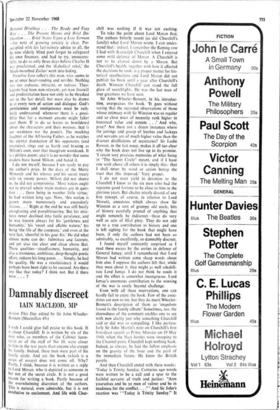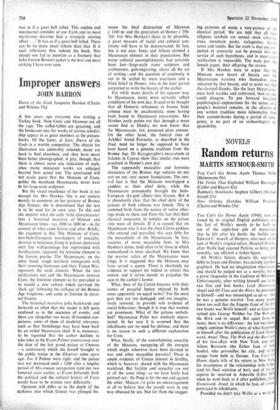Damnably discreet
IAIN MACLEOD, MP
Action This Day edited by Sir John Wheeler- Bennett (Macmillan 45s) I wish I could give full praise to this book. It is about Churchill. It is written by six of the men who, as members of the Cabinet Secre- tariat or of the staff of No 10, were closer to him in the war years than anyone else except his family. Indeed, these men were part of his family circle. And yet the book (which is a series of essays) does not come off. Why? Partly, I think, because it is written as a reply to Lord Moran, who is depicted as someone in but not of the secret circle. It is not a good reason for writing a book. Partly because of the overwhelming discretion of the authors. This is natural, even admirable, but it is not conducive to excitement. And life with Chur- chill was nothing if it was not exciting.
To take the point about Lord Moran first. The authors bitterly resent (as did Churchill's family) what Lord Moran wrote. I can under- stand that : indeed. I remember the flaming row I had with Randolph Churchill when I entered some mild defence of Moran. A Churchill is not to be clawed down by a Moran. But Churchill's health, together with how it affected the decisions he took, is a proper matter for his- torical recollections and Lord Moran did not publish his book until a year after Churchill's death. Winston Churchill can stand the full glare of searchlights. He was the last man of true greatness we have seen.
Sir John Wheeler-Bennett, in his introduc- tion, overpraises the book. 'It goes without saying that the recorded observations of those whose intimacy with Sir Winston was so regular and so close must of necessity rank higher in historical value and esteem. . . .' And why, pray? Are there not a dozen instances where the jottings and gossip of leeches and lackeys and servants are of much higher value than the discreet distillations of secretaries? Sir Leslie Rowan, in the last essay, makes it all too clear why the book does not live up to its promise. '1 retain very precious memories of what being in "The Secret Circle" meant, and if I have one wish above all others it is simply this: that I shall never by word or action betray the trust that this imposed.' Very proper.
I do not even yield in devotion to the Churchill I knew to the six men who had the supreme good fortune to be close to him in the glorious years. But chatter utterly devoid of any bite (except, of course, in relation to Lord Moran), anecdotes which always show Sir Winston as a sort of grumpy old uncle, bits of history carefully pruned of anything that might remotely be indiscreet—these do very well as acts of filial pty. They do not add up to a true contribution to history and one is left sighing for the book that might have been, if only the authors had not been so admirably, so excellently, so damnably discreet.
I found myself constantly surprised as I read these essays by the sorties in ,defence of General Ismay, until I remembered that Lord Moran had written some sharp words about him also. I suppose the authors felt that, while they were about it, they might as well rehabili- tate Lord Ismay. I do not think he needs it and the effect is somewhat incongruous. Lord Ismay's enormous contribution to the winning of the war is surely beyond challenge.
Even with all these reservations, one can hardly fail to enjoy the book. Few of the anec- dotes are new to me. but they do merit Wheeler- Bennett's description of them as 'snapshots found in the family album.' Sometimes, too, the shrewdness of the comment enables one to see with new clarity just why something Churchill said or did was so compelling. I like particu- larly Sir John Martin's note on Churchill's first broadcast speech as Prime Minister on 19 May 1940, when the Nazi hordes were sweeping to the Channel ports. Churchill kept nothing back. Indeed, as always, he laid the fullest emphasis on the gravity of the hour and the peril of the immediate future. He knew the British people.
And then Churchill ended with these words: 'Today is Trinity Sunday. Centuries ago words were written to be a call and a spur to the faithful servants of truth and justice : "Arm yourselves and be ye men of valour and be in readiness for the conflict...."' And Sir John's reaction was "'Today is Trinity Sunday." It
was as if a great bell tolled. This sudden and unexpected reminder of our Faith and its most mysterious doctrine had a strangely moving effect. . ..' It was as if a great•bell tolled. There can be no more exact tribute than that. It is such reflections that redeem the book. Nor should one fail to mention as a footnote that John Fenton Brown's jacket is the best and most striking I have ever seen.



































 Previous page
Previous page